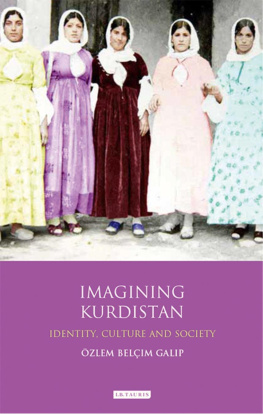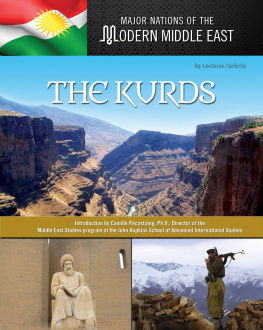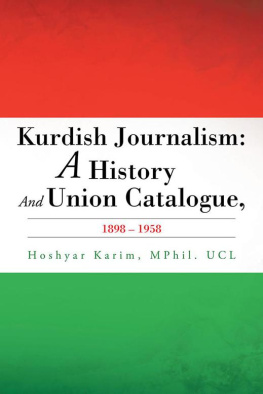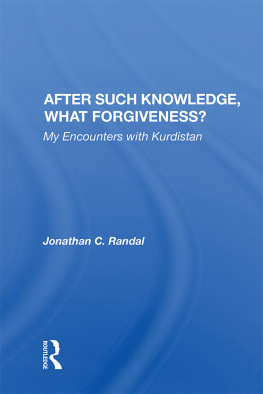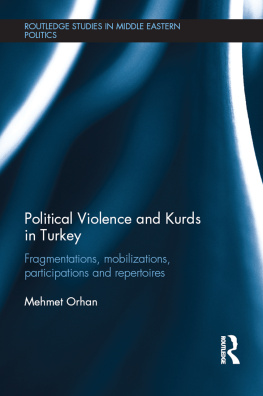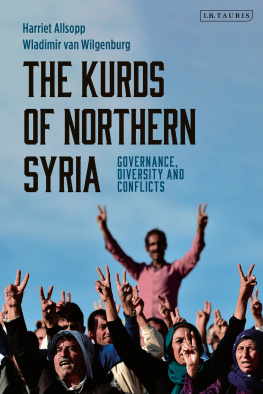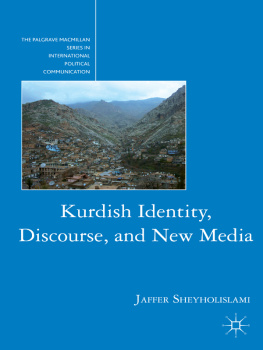Published in hardback in 2015 by
I.B.Tauris & Co Ltd
London New York
www.ibtauris.com
Copyright 2015 zlem Galip
The right of zlem Galip to be identified as the author of this work has been asserted by the author in accordance with the Copyright, Designs and Patents Act 1988.
All rights reserved. Except for brief quotations in a review, this book, or any part thereof, may not be reproduced, stored in or introduced into a retrieval system, or transmitted, in any form or by any means, electronic, mechanical, photocopying, recording or otherwise, without the prior written permission of the publisher.
References to websites were correct at the time of writing.
Written Culture and Identity 3
ISBN: 978 1 78453 016 7
eISBN: 978 0 85773 824 0
A full CIP record for this book is available from the British Library
A full CIP record is available from the Library of Congress
Library of Congress Catalog Card Number: available
INTRODUCTION
The Kurds, who belong to the worlds largest nation deprived of its own state, live in the territories of the states of Turkey, Iran, Iraq and Syria. Following the 1991 Gulf War, the Kurdish question in the four regions became a particularly crucial issue within the Middle East and in international politics more broadly. Hence, issues around Kurdish nationalism and political problems have received considerably more attention than matters of culture, including literature. However, though studies on Kurdish literature have remained relatively peripheral, research (undertaken mainly in Europe and the United States) on their literature from all Kurdish regions and in both Sorani and Kurmanji dialects,
Linguistic diversity and the lack of political and national unity have not only shaped the fragmented character of Kurdish novelistic discourse, but have also forced the displacement and voluntary migration westwards of many Kurds in search of freedom. While some Kurdish intellectuals have, because of political conflicts, chosen the path of exile in various Western countries and have had the opportunity to publish their novels in their native dialects (Sorani and Kurmanji), others, despite political conflicts, have not left their homeland; nevertheless those who remained have from time to time been obliged, or have sometimes preferred, to write in the official languages of the state, such as Persian, Arabic, or Turkish. both as a symbol and as territorial space, constructed in Kurdish novelistic discourse in both Turkish Kurdistan and diaspora?
Homeland and Identity
This book examines what home-land and identity mean both for the narrative of being at home, and for the narrative of leaving home. In this context, one main question is posed: What are the differences and similarities in the perception of homeland and identity in Turkish Kurdistan and diaspora? Applying a conceptual framework based on home, homeland, place, diaspora, and identity, I investigate the geographical sense of Kurdistan, whether symbolic or factual, in a selection of novels from Turkish Kurdistan and its diaspora. In this respect, I seek answers to two further questions: How is Kurdish territory drawn? And what kind of meanings and values are attributed to Kurdistan?
In examining whether the Kurdish novel represents Kurdishness as a national entity connected to a particular region and community, I also discuss the textual representation of Kurdistan, and the novelists intentions in the way it is represented. Through comparative analysis, valuable insights can be obtained for understanding the geographical sense of Kurdistan. The differences or similarities that exist between novelistic discourse in Turkish Kurdistan and its diaspora demonstrate how statelessness and fragmentation affect the characters, society, themes, and world of the novels chosen. This is crucial, especially in the context of exploring the achievements of Kurdish narrative discourse in emphasising the reality and continuing damage of the statelessness that has been inflicted upon the Kurds in Turkish Kurdistan and in the diaspora.
Some secondary questions are also considered: for instance, acknowledging that the Kurds are a stateless nation and therefore fragmented, to what extent and in what way have Kurdish characters in the novels been influenced by this fragmentation and statelessness? And if fragmentation and statelessness have had a significant impact on the Kurds, has this influenced literary identities in different ways in Turkish Kurdistan, on the one hand, and diaspora, on the other?
Beyond Analysis of the Text
In this book, a Kurdish novel is a Kurdish-language work written in any dialect of Kurdish. This also relates to the discussions on Kurdish national identity, in which the Kurdish language is regarded as one of the markers of Kurdish identity (Vali 2003: 100, McDowall 2004: 9). There is an opposing view concerning the various distinct dialects, to the effect that Kurds do not think of themselves as a group primarily along linguistic lines (zoglu 2004: 17), since there are certain other cultural sentiments. Most importantly, the majority of the novelists examined in this book have also addressed the significance of Kurdish for the Kurds, both in their novelistic discourses and in their other publications, and often encourage the Kurds to read and write in Kurdish. Accordingly, an essential requirement when selecting the novels was that they were written in the Kurdish language.
In order to draw a comprehensive picture of the Kurdish novelistic discourse and to ensure an accurate outcome, I have included all the 100 novels published in Turkish Kurdistan and its diaspora between 1984 and March 2010. It is not my intention to discuss every novel that might conceivably be treated as proposing the same social, political, and cultural ideas. My point of departure for limiting myself to one region is primarily that identities and perceptions of home-land have developed differently in relation to contextual and political differences in each of the nation states (Chaliand 1993, Natali 2005, Romano 2006). The situation of the Kurds from Iraqi Kurdistan or Iranian Kurdistan is different from the circumstances of those in Turkey, owing to the different socio-political and cultural contexts of these non-Kurdish nation states. Being dominated by different nations means that the Kurds are confronted by different policies, which causes them to create different literary discourses.
This does not necessarily assume the lack of a common Kurdish literature; rather, it attempts to reach an accurate comparative analysis of literary texts within the same dialect and related to the same political, social, and ideological environment. Moreover, to include novels from different regions would require research on all these regions and their diasporas, which would be impractical for a literary analysis based on diverse methodological approaches. First, the novels from other regions are written in different dialects (Zazaki or Sorani) and different scripts (Arabic). Secondly, due to the number of novels, a comprehensive focus on one region is more feasible. This is why the scope of this book is limited to novels written by authors from Turkish Kurdistan and its diaspora.

